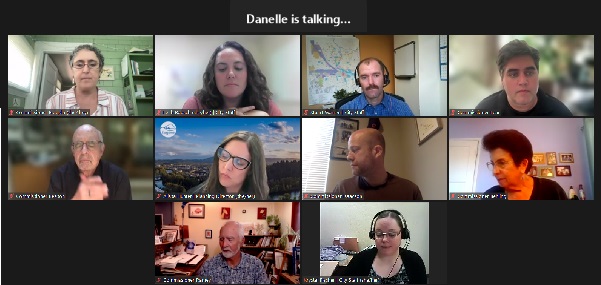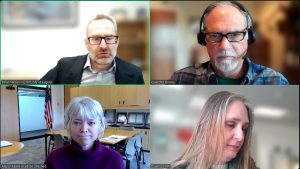Where can homeless go? City remains silent
5 min read
During public comment Aug. 27, the Eugene Planning Commission was asked: Where can people go?
Krystal Fischer: Hi, everyone. My name is Krystal Fischer. The Planning Commission has allotted a maximum of 10 minutes for public comment this evening. To ensure anyone wishing to speak has an adequate opportunity to do so, each speaker will be limited to 3 minutes. Danelle will be our first public commenter tonight.
Danelle Carlson: Hi, I’m Danelle Carlson, and I live at the Community Supported Shelters, the end of Washington street. And I’m just trying to figure out: Where can the homeless people go? You know, they’re being swept every day. Their stuff’s being taken. Most of them don’t even get their stuff back. You know, it’s actually in reality almost, it’s being stolen, basically. If you look at it, it is being stolen because they’re not getting their belongings back. It’s being thrown away or they don’t know where it’s at.
[00:00:57] You know, they’re told they can’t be here. Okay. Well, where can they be? Where can we be?
[00:01:03] Just because I live in a hut, I don’t forget where I came from. We are all human beings and the cops have been heard saying that they’re NHI which is ‘non-human involved.’ Bull. We’re humans. We’re humans and we deserve to be treated like humans, regardless of whether we’re homeless or not. We all are trying to survive.
[00:01:25] You know, I got into a hut. I bettered myself. That’s all people need, is a place to go. So can we get some help here? That’s all I’m fighting for, is to get some help. And I have no problems with putting myself out there to help with ideas or to help with whatever. But we need some help. This isn’t fair. It’s every day and they’re being, they’ve been, the cops have been videoed of being brutal, assaultive, rude, disrespectful.
[00:02:05] I mean, the tents being ruined and then the cops turn around and leave. What are they supposed to stay in after they do that? We’re being treated, people are being treated like trash and I’m sorry, but we’re not trash. We all bleed just like everybody else. Just because somebody has a home doesn’t make them any better than somebody that doesn’t. That’s all I got.
[00:02:33] Krystal Fischer: You do have just under a minute remaining.
[00:02:36] Danelle Carlson: It’s all I got for right now.
[00:02:37] Krystal Fischer: Okay. Thank you.
[00:02:40] John Q: The same question came up at the KEPW News Team meeting.
[00:02:47] Sam Broadway (KEPW Newsday): I’m going to just lay it on the line of what Eugene is going through, helping people transition from the street to housing: Well, there is none. No housing. The physical structures are not here to do that.
[00:03:04] And that’s part of the problem is, you got all these people. We got 4,700 people out there with nowhere to go. And because of the (Grants Pass) Supreme Court decision, municipalities do not need to tell people a designated place to go.
[00:03:23] We’re doing it now. We’re banning all people from camping on any public property, anywhere in the city, but, and that’s my biggest thing is, there’s nowhere designated here where the homeless can go.
[00:03:39] We were told a few years ago that was impossible. It was impossible to determine an area where the homeless could go. If Los Angeles can do it, and Grants Pass, the meanest city on the face of the earth in Oregon can do it, Eugene can do it. And Eugene needs to do it.
[00:04:04] I want answers. I’m tired of this, I want answers, and, you know, if they’re not going to help me get to the place where I get the answer to where we can go, then I’ll continue with my informal meetings to continue to find the answer.
[00:04:21] We’ve got a group I have formed of various advocates across the city here, some old and some new advocates, some homeless and some not. And I’ve called them all together, and they’re called the Pathfinders because we’re trying to find the best path to get the answer to our question: Where can people go?
[00:04:46] That’s the biggest thing. Where can people go? I’ve been trying to do through LEAGUE (Lived Experience Advisory Group for Unhoused Engagement) and the Human Rights Commission, I was trying to get answers to bathroom access and other basic things that people need when you’re homeless.
[00:05:05] You know, let’s get away from all the frills and thrills of being homeless. Let’s get down to the basics, what people need basically. And now it’s even gotten more basic. Now before we can deal with bathroom access or anything else, we need to know where people could be.
[00:05:24] And the city of Eugene has also said it’s a problem of some sort to put up a port-a-potty or two and a trash dumpster. That doesn’t seem to work for them. They find fault with doing that. So, you know, if we’re not even going to get to the place where we can have a port-a-potty and a dumpster and a place to go, then exactly what are they saying to the homeless?
[00:05:54] ‘Just die’? Because that’s what it sounds like. It sounds like, you know, we don’t care what happens to you, just don’t be where we can find you.
[00:06:04] John Q: After Danelle spoke Aug. 27, Planning Commission members had the opportunity to respond.
[00:06:11] Jason Lear (Eugene Planning Commission chair): Do any members of the Commission want to respond to public comment?
[00:06:19] John Q: Before and after the Supreme Court decision in Grants Pass, the city of Eugene remains silent on the question: Where can people go?
UPDATE (Aug. 28, 2024, 4:30 p.m.) Eugene Police Department Public Information Officer Melinda McLaughlin responded to the public comment:
“That term ‘NHI’ does not exist in our system and would not be acceptable language.
“Our policy covers this: ‘Employees shall, on all occasions in the performance of their duties or after identifying themselves as an employee of the Eugene Police Department, be respectful, courteous and considerate toward the public, their supervisors, their subordinates, and all other employees. No employee shall use epithets or terms that tend to denigrate any particular gender, race, nationality, and sexual orientation, ethnic or religious group, except when necessary to quote another person in reports or in testimony.’
“Here is the Standards, Duties, and Conduct policy. If someone would like to report an issue, please have them contact the Police Auditor.”






